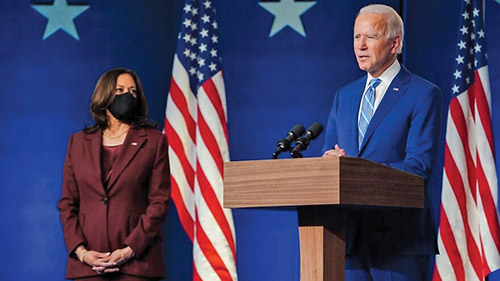
U.S. President-elect Joe Biden named his top foreign policy staff this week. He announced, as expected, that Antony Blinken would serve as secretary of state.
“We have no time to lose when it comes to our national security and foreign policy,” the president-elect said in a press release. “I need a team ready on Day One to help me reclaim America’s seat at the head of the table, rally the world to meet the biggest challenges we face, and advance our security, prosperity and values.”
Biden also tapped former secretary of state and former senator, John Kerry, as special presidential envoy for climate. He will sit on the National Security Council as well. “This marks the first time that the NSC will include an official dedicated to climate change, reflecting the president-elect’s commitment to addressing climate change as an urgent national security issue,” the transition team said in a press release.
Ambassador Linda Thomas-Greenfield, a veteran member of the Foreign Service, would serve as ambassador to the U.N. Thomas-Greenfield served in many positions during her 35-year service, including as ambassador to Liberia. She was posted in Pakistan, Nigeria, Kenya, and at the U.S. Mission to the U.N. in Geneva. In 2013, she was appointed as assistant secretary for the Bureau of African Affairs. Thomas-Greenfield also served as director-general of the Foreign Service and director of human resources and deputy assistant secretary for the Population, Refugees and Migration Bureau.
Ambassador Barbara Bodine is the director of the Institute for the Study of Diplomacy at Georgetown, where Thomas-Greenfield was the inaugural Distinguished Resident Fellow in African Studies from 2017-19.
Bodine believes that the fact that Thomas-Greenfield’s name came out at the same time as Blinken and Jake Sullivan (national security advisor) and before the other members of the administration, “signals that diplomacy is going to be a fundamental tool, not a secondary tool, and that we want to re-engage credibly, collaboratively, with our partners, our friends and the rest of the world.”
She noted that Thomas-Greenfield is experienced in “conflict areas and worked on how do you craft sustainable agreements to bring about peace.”
Bodine noted that the U.S. is going to chair the Security Council starting in March, which will require a knowledgeable person to hold the position. She added that Thomas-Greenfield doesn’t have experience with Israel or the Near East, “but she is going to represent the policy of the administration” when it comes to the region.
According to media reports, Biden named Jake Sullivan as a national security advisor. Sullivan previously served in the Obama administration as deputy assistant to the president and as Vice President Biden’s national security adviser. He also served as former Secretary of State Hillary Clinton’s deputy chief of staff and director of policy planning. He was instrumental in shaping the 2015 Iran nuclear deal.
In an op-ed for NowThis News in January, he defended the agreement. “Under the deal, Iran’s nuclear program was in a box, it was frozen,” Sullivan wrote. “Under the deal, there were no rocket attacks killing Americans in Iraq…Today, Iran is attacking shipping in the Gulf and threatening the rest of the region.”
In August, he spoke at a webinar hosted by Democratic Majority of Israel, and said that Biden believes that “it is not a concession of leverage to sit down with Iran at the bargaining table.”
Sullivan said that at the end of the day, “what has been proven out over the past few years is that the United States has immense capacity, through the financial sanctions tool, to very swiftly ratchet up pressure. We did that in the Obama administration; the Trump administration did it; Iran knows that.
“He [Biden] fundamentally believes that there’s a way to interplay the diplomacy side of this equation and the pressure side of this equation in a way that will help us secure the objectives that we’re trying to achieve,” Sullivan added.
According to Sullivan, diplomacy backed by pressure that creates leverage “is the kind of formula that could work again to make progress, not just on the core nuclear issues, but on some of these other challenges as well.
“One of the vice president’s commitments and all of this is to get to the table to be able to negotiate a follow on agreement that does materially advance the security of the United States, of Israel, and our other regional partners as well, and does hold Iran to account. And he believes that that is the best way to actually produce a durable outcome,” he added.
Following the signing of the Abraham Accords, Sullivan praised the move, saying the deal was a “positive accomplishment” for President Trump’s foreign policy.
“It’s good for the region, it’s good for Israel, it’s good for peace,” said Sullivan during an interview on the Yahoo News podcast Skullduggery.
By Omri Nahmias/Jerusalem Post













